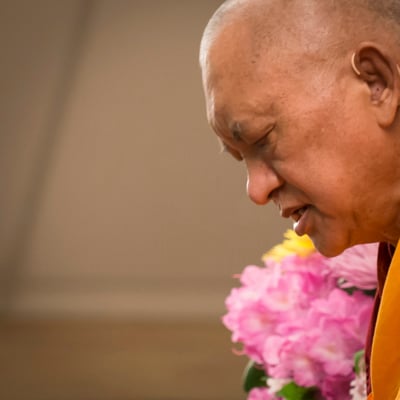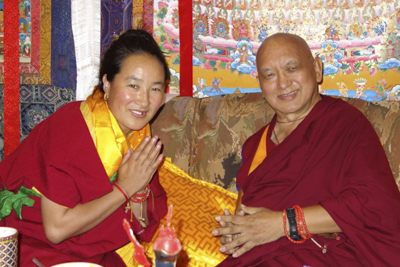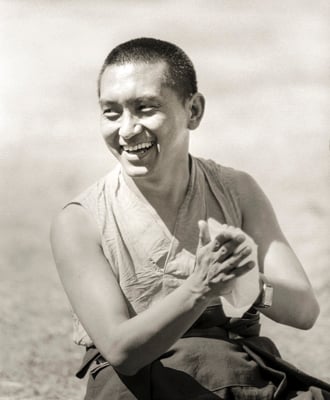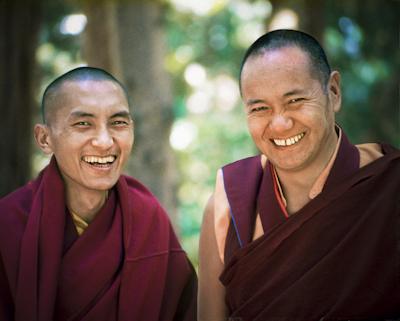Dear LYWA friends and supporters,
Thank you for your incredible support of the Archive's work. A special thanks to those who made a donation during Saka Dawa last month. We rejoice in the merit generated, and remain grateful to all of you who partner with us to provide these precious teachings to all.
Images from Light of the Path Retreat
As many of you know, last month Lama Zopa Rinpoche was in North Carolina leading this year's Light of the Path retreat. By all reports it was an amazing experience for all who were fortunate enough to be there.
 We have just posted a series of pictures from this retreat to our online Image Gallery, taken by Roy Harvey. You can even see more photos from the retreat on Institut Vajra Yogini's Facebook page, taken by Violette Pliot and, as always, there are extensive photo galleries of Rinpoche available on the FPMT website.
We have just posted a series of pictures from this retreat to our online Image Gallery, taken by Roy Harvey. You can even see more photos from the retreat on Institut Vajra Yogini's Facebook page, taken by Violette Pliot and, as always, there are extensive photo galleries of Rinpoche available on the FPMT website.
We are working hard on making the transcripts from the teachings available. In the meantime, you can view videos of the retreat on the FPMT's Online Learning Center.
New Lama Zopa Rinpoche Teachings Posted
We have just posted Rinpoche's Advice for Circumambulation, a series of teachings compiled by Ven. Sarah Thresher with the assistance of Ven. Dekyong, in Bodhgaya, India, 2014. Rinpoche explains:
Even if you only circumambulate one or two times using this method, you become enriched with so many skies of merit and receive very deep purification. This is an extremely important practice for quick enlightenment.
 We have also posted a long life prayer for Rangjung Neljorma Khadro Namsel Drönme (Khadro-la) composed by Rinpoche. The translation was done by Ven. Sönam Tharchin at retreat with Khadro-la in August 2012 at Nalanda Monastery, France. Khadro-la is pictured here with Rinpoche at Kopan Monstery in 2013.
We have also posted a long life prayer for Rangjung Neljorma Khadro Namsel Drönme (Khadro-la) composed by Rinpoche. The translation was done by Ven. Sönam Tharchin at retreat with Khadro-la in August 2012 at Nalanda Monastery, France. Khadro-la is pictured here with Rinpoche at Kopan Monstery in 2013.
New Advice from Lama Zopa Rinpoche
We recently posted a wonderfully detailed advice from Rinpoche on Essential Daily Practices. In this letter you will find Rinpoche's advice on many practices, such as reciting Om Mani Padme Hum; Medicine Buddha, Vajrasattva and Thirty-Five Buddhas practices; lam-rim meditation; and lam-rim prayers to recite. There are links to all the prayers and practices mentioned in the advice. Thanks to our web editor Sandy Smith for annotating the advice to make it such a precious resource for daily practice.
Rinpoche has also asked that some letters addressed to him be made available to everyone, and here is one that we recently posted in our Students' Letters section of the advice book:
Dear Lama Zopa was the title of a book I read some years ago. That book, I believe, was the best thing that had/has happened to me in my whole life. Suddenly, everything fell into the right places. The hopelessly distorted world that I could neither understand nor adapt to, was magically transformed and “straightened” by your words.
As if for the first time in my life someone said that right things were right and wrong things were wrong. I felt such a relief. Before, it was always the other way round: right things were wrong, and wrong things were right. Non-virtue was considered to be virtue, and virtue appeared to be something one must be ashamed of. It was very confusing.
Since then, I’ve read more books of yours. Each of them was exactly like the first one: the best thing that has ever happened to me in my life. They all were like a medicine, healing my own mind and the world around me at the same time. Thank you.
See Rinpoche's Online Advice Book to read more new advices, such as practices for when there is an invasion of insects in one's house, particularly relevant for those of us just getting into the summer months; advice on blessing bulk food produced in a factory; advice on making and circumambulating stupas; and many more.
See here for a list of all new advices added to the online advice book this past month. We now have nearly 1,500 advices posted! Thanks again to web editor Sandy Smith who manages this ever growing collection of advices and works so hard to organize them in a way that makes it possible for readers to find what they are looking for, or to simply browse around the book for topics of interest.
Ebook News and More Hot off the ebook press is another book originally published by our friends at Amitabha Buddhist Center, Ribur Rinpoche's How to Generate Bodhicitta. The ebook version is available on Amazon, Smashwords and Lulu right now, with other versions soon to be available. Visit our website for links to these ebooks, and we'll let you know as the other versions become available.
Hot off the ebook press is another book originally published by our friends at Amitabha Buddhist Center, Ribur Rinpoche's How to Generate Bodhicitta. The ebook version is available on Amazon, Smashwords and Lulu right now, with other versions soon to be available. Visit our website for links to these ebooks, and we'll let you know as the other versions become available.
A few months ago we announced that we had published the ebook version of another ABC title, A Commentary on Praises to the Twenty-one Taras by the late Khensur Rinpoche Lama Lhundrup Rigsel. At that time, the ebook version was only available through Amazon but now it is available just about everywhere. Visit our online store to find links to purchase the ebook.
We are happy to report that you can read LYWA ebooks on your android phone or tablet with the Aldiko eBook Reader. Aldiko lets you customize your reading experience and can support all those late-night Dharma reading sessions! Download Aldiko to your phone through Android Market or Google Play and simply search for our titles within the app through the Smashwords catalog.
And, we also have our titles on Scribd and Oyster ebook subscription services, available for both iOS or Android devices.
Plans are in the works to create some ebook-only titles. We are planning on compiling Lama Zopa Rinpoche's teachings from the 24th Kopan course from 1991 into a series of short ebooks. We'll keep you updated on this project as well, and you can get a taste of the teachings from that course in this month's eletter teaching below.
And finally, we are happy to announce that thanks to volunteer Alan Wilson we have three more titles available in Braille: Ego, Attachment and Liberation, How Things Exist and The Joy of Compassion. We now have 6 titles available in Braille with more to come! We have also begun the process of creating audio books of our titles; more information about this project as it unfolds.
Visit to Milarepa Center
Next month I will be leading a retreat at beautiful Milarepa Center in Barnet VT, titled "How to Be Happy: The Path to Bliss." In this short course, which is based on the famous Kopan one-month courses, we will examine the Buddhist path to happiness and how to put it into practice. Topics to be covered include the nature of the mind, meditation, suffering and its causes, cause and effect, the nature of reality and, of course, how to be truly happy. I hope some of you will be able to join me. There are a couple of articles of mine on the LYWA website which are related to the course: "An Outline of the Path to Enlightenment", which is the Introduction to the LYWA publication Teachings From Tibet; and "Meditation in Tibetan Buddhism," a magazine article written in 2000.
Also I want to remind you that Lama Yeshe Wisdom Archive is listed in the Amazon Smile program. For those of you who shop regularly through Amazon.com (like me) it is easy to get in the habit of going through smile.amazon.com to shop, and when you select LYWA as your organization of choice a portion of your purchase is donated to the Archive.
Thank you for your kind and generous support.
Much love, 
Nick Ribush
Director
This Month's Teaching: Why We All Need to Develop Compassion
 Whatever we are doing, in our everyday life or our Dharma practice—listening, reflecting and meditating—our basic motivation, our attitude, has to be compassion. Here we’re not just talking about partial compassion, compassion toward somebody who loves us or a friend—except when that friend has a problem—but compassion to strangers and enemies as well. Compassion toward all sentient beings should be the motivation for why we study the Dharma, why we do anything. That should be our motivation as much as possible for every action we do every twenty-four hours.
Whatever we are doing, in our everyday life or our Dharma practice—listening, reflecting and meditating—our basic motivation, our attitude, has to be compassion. Here we’re not just talking about partial compassion, compassion toward somebody who loves us or a friend—except when that friend has a problem—but compassion to strangers and enemies as well. Compassion toward all sentient beings should be the motivation for why we study the Dharma, why we do anything. That should be our motivation as much as possible for every action we do every twenty-four hours.
Compassion is so important in order to achieve peerless happiness, full enlightenment, for the sake of all sentient beings. Even without talking about enlightenment, just concerning our day-to-day happiness, there’s the need for compassion. Happiness in our daily life depends on compassion; peace in our daily life depends on compassion, on us having compassion toward others and others having compassion toward us. Generally speaking, happiness depends on each other.
Why does each of us need to generate compassion? First of all, what other sentient beings want is happiness; what they do not want is problems, suffering. And that is dependent on conditions, on whether we have compassion or not for them, whether we stop actions that disturb them, that give them harm, and whether we do actions that benefit them. Without compassion, with the ego, the self-centered mind, the self-cherishing thought, out of that mind we do actions that harm them. So others’ peace, others’ happiness is also dependent on our own attitude, our own actions. That’s why we all need to develop compassion.
The second reason why there’s the need to generate compassion is because we want happiness. We ourselves want happiness, peace, success; we don’t want problems. That’s the second reason.
If we have compassion everybody becomes our own friend, everybody becomes close to us. We don’t feel others are distant, far from us. If we have compassion toward others, then we feel everybody is in our own heart. There’s a great feeling of that. We are like the son or daughter who respects the parents, knowing how incredibly kind and precious they are and therefore feels the parents in the heart. Similarly, we are like the mother who has compassion toward her beloved only child, who is so precious and important to her, feeling the child in her heart.
If we have compassion toward all sentient beings, nobody’s distant from us; everyone’s close to us. We feel that in our own heart. Even if somebody harms us—what others would call an enemy—since in our own mind there’s compassion generated for him, we don’t see him as an enemy, only as a friend, only as most kind. He is the spiritual friend, stopping our own cruel mind, the self-cherishing thought. He is the most unbelievably kind person because he destroys the ego that constantly interferes with the most important success, the development of the positive attitude, the good heart. Even if from our own side we try to practice the Dharma, the ego, the self-cherishing thought, always interferes with us generating the realizations of the path, making us unable to progress.
Not just that, the ego creates all the problems. It controls us, it invades the mind. Like the Communist Chinese invaded Tibet, the ego invades our own mind, completely taking over our mind and making us its servant, its slave. We become the disciple of the ego, the slave of the ego, making it stronger, nurturing this ego that is creator of all of life’s problems. The ego not only interferes with our spiritual progress, blocking us from achieving the realizations of the path, the development of the practice, it also interferes in our day-to-day life, not allowing us any peace, happiness or satisfaction. All the time that we are acting as the servant of the ego, helping it, supporting it, the ego brings us relationship and financial problems; it brings us every type of problem.
We follow this ego but this person that we call “enemy” is helping us to destroy the ego, this thing that brings all the problems. Because he is helping us destroy the ego that we would otherwise follow, he is the kindest, most precious friend. By diminishing and then eliminating the ego, all success comes, especially the most important success, developing the mind to achieve the realizations of the path to enlightenment.
Therefore we should have compassion for all others, like a son or daughter with a crazy mother. Even if the mother becomes crazy, completely wild, completely uncontrolled, possessed by spirits, the child still sees how incredibly kind and precious she is, that she herself has no freedom, and so she becomes only the object of compassion.
Likewise, we see the person who harms us is completely overwhelmed by ego, completely used by ego, controlled by ego, the self-cherishing thought, and the disturbing thoughts, especially anger. Being under the control of the self-cherishing thought and these disturbing thoughts, he creates negative actions that result only in problems, now and in the future. Seeing how his actions bring him suffering, he becomes only the object of compassion. There’s no single valid reason to become angry with him and harm him. That person’s situation—the nature of his mind, his character, his life—only becomes the cause for compassion to arise for him.
If we generate compassion, we become a friend to everybody and everyone becomes our friend. With this positive attitude toward everybody, because others naturally feel friendly toward us, we receive no harm from them, only benefit, only help. This way, there’s success in our life. Happiness, peace depends on others helping. Our day-to-day life’s happiness is dependent on others, on others having love and compassion toward us, not giving us harm but benefiting us. Loving us, having compassion toward us, helping us, is dependent on how we behave toward others, on what kind of attitude we have toward them.
First of all, our happiness, our peace is dependent on what others think of us, how they act toward us, and that is dependent on how we think and behave toward them. This second reason is the fundamental one, why even for our own success—having happiness ourselves and not having problems—we need to practice compassion toward others.
I quite often say this. Historically it happens that there is one person in the world who has power. If that person lacks compassion, then many millions of people can be killed and tortured. This is without counting the animals on the land and in the ocean that are so much more numerous than human beings that are also killed and made to suffer.
If this one person who has power and influence were to practice compassion, instead of harming many millions of people, it would be the complete opposite. He could bring incredible benefit, incredible peace and happiness, to many millions of people. It’s the complete opposite. Because of compassion, that one person’s power could be used for unbelievable benefit and happiness, for thousands and millions of sentient beings.
When there is power, with compassion it makes a huge difference what it can do to the world, but without compassion, this one person’s power can bring such danger to the world. It makes a huge difference, not just to one country but to the whole world.
Similarly, if we don’t practice compassion, if we don’t generate compassion, there’s a danger that we harm other humans and other sentient beings from birth until death. Because of the self-cherishing thought, many other disturbing thoughts arise: ignorance, anger, attachment and so forth. We do many harmful actions toward others. From birth until death in this life we give so much harm to others, and this continues from life to life, giving harm to all sentient beings, like the example of this one person.
Now if we ourselves have compassion, we benefit others in our everyday life, starting from our partner to our family—those we work, eat and live with at home—to the people in the office, then all the people in the country—however many millions of people there are—then all the sentient beings on this earth, then even the sentient beings on the other planets, in the other universes. From the nearest sentient being to all the rest of the sentient beings, if we have compassion, none of them receive any harm from us. If there’s compassion, whatever action we do, we stop giving harm. Even if we gave harm before when there was no compassion, now that harm is stopped. Therefore, not one single sentient being receives harm from us. And that absence of harm, their not receiving harm from us, that is the peace that they receive from us. That peace they receive is dependent on us.
If we have compassion the motivation for whatever action we do is to benefit others. When we do something, it not only stops giving harm but, on top of that, we try to benefit others, we do something for others, either directly or indirectly. The very least thing is we stop giving harm but out of compassion we benefit others, therefore, from that all sentient beings receive happiness, success and peace. The peace and happiness that they receive by us benefiting them is dependent to us.
Each of us is completely responsible for the happiness of everybody, not only of every human being but of every single sentient being. We are responsible for each insect we see on the road, each fly, each bird, each dog. Each of us is responsible for the happiness of every single sentient being that we see around us in our everyday life, starting from that fly on our table to all the other sentient beings. If we don’t practice compassion, if we only follow the ego, the self-cherishing thought, there is danger to others, starting from our family, from the people nearest us, to all the other sentient beings. They all receive harm from us, directly or indirectly, from life to life.
Therefore, it is completely in our own hands what we do. Whether we want to give peace and happiness to all sentient beings or whether we want all sentient beings to receive harm from us is completely in our own hands. It depends solely on what kind of attitude we generate.
Excerpted from Lama Zopa Rinpoche's teachings at the 24th Kopan Course in 1991. Edited by Gordon McDougall. The remainder of these teachings are forthcoming as an ebook.





























